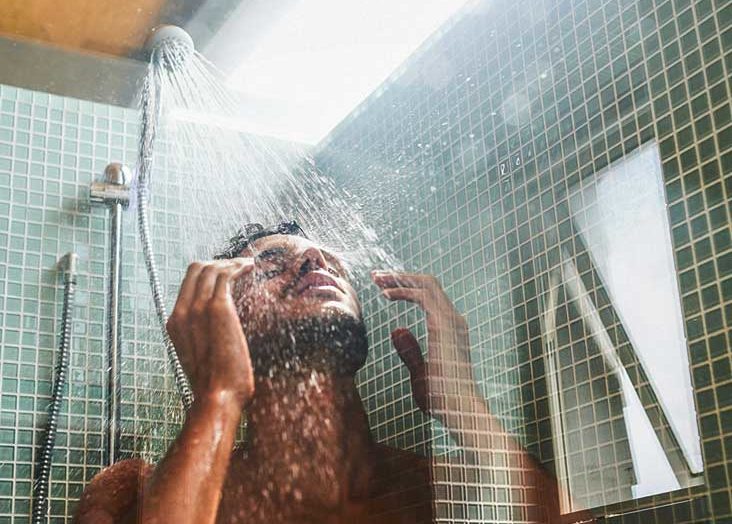Whether you start or end your day with a shower (or perhaps both), you probably don’t think all that much about the temperature beyond what feels good to you. You know how hot (or cool) you like it; or, maybe you change it up depending on if you want to warm up or cool down.
Stepping into a nice, steamy shower on a cold day offers a wonderful, relaxing retreat—at least for a couple of minutes. And a nice cool shower can be heaven when you come in from the heat or just need to cool down after a seriously sweaty workout.
But, when it comes to temperature, is there more than meets the eye? In other words, could your shower (or bath) being do much more for you given the right temperature?
The short answer? Yes! And below, we’re going to delve into the benefits of hot showers and the benefits of cold showers. And depending on your goal, you may want to start changing which direction you turn the dial to get more than just clean out of your shower time.
Let’s take a look at some of the benefits of hot showers and cold showers now…
Benefits of Hot Showers
Faster Sleep
Beyond just feeling nice, the most well-known benefits of hot showers (or baths) is better sleep. Research on “water based passive body heating” (yeah, I think it would just be easier to say warm water bathing too), shows that it does indeed help improve sleep quality.
If sleep seems elusive or you’re feeling stressed before bedtime, one research-supported technique to try is bathing for 10 minutes or more about an hour or two before bed at a temperature between 104 and 109 degrees—ahhh… nice and warm. 1
This can help you fall asleep, on average, 10 minutes faster. Considering it takes the average person 10 to 20 minutes to fall asleep, that’s pretty impressive.
In another small study, it was found that you don’t even need to take a full-on shower or bath. Just soaking your feet in a hot water can help you fall asleep faster. 2
If you’re the type of person who regularly finds yourself still awake an hour after you hit the sack, you likely need to address the rest of your sleep hygiene in addition to a hot bath, shower or foot soak.
So, why does a warm bath or shower help you get to sleep? Research has shown that sleep cycles are regulated by the circadian clock, which is profoundly affected by the body’s core temperature. During sleep, the body’s core temperature is at its lowest, and it begins to rise as the morning approaches.
Because a warm bath enhances circulation and increases the dissipation of body heat, it can help the body reach that cooler temperature to prepare for sleep. It also helps activate the rest and digest system (i.e., the parasympathetic nervous system).
Provides a Morning Wake-Up
On the flip side, a hot shower in the morning can help warm up your stiff, tight muscles to help you loosen up for the day, especially before a workout. It can help get your blood flowing and prime your body for the rigors of the day and help ease muscle soreness—at least temporarily. 3
Cold & Flu Relief
If you’re suffering from a cold or the flu, you may also benefit from a nice hot shower—the hotter, the better. The steam can help open up your airways, loosen up mucus, and clear out your sinuses so you can breathe easier. And the moist air can help soothe your dry, irritated sinuses. Adding a few drops of peppermint, eucalyptus, pine, cinnamon, or tea tree oil may also help. (Just make sure you don’t have any allergies or sensitivities to the oils first.)
Clear Skin
Moist heat has also been shown to help unclog skin pores, allowing you to clean out deeply trapped oil and dirt to fight skin blemishes. On the other hand, it can also increase oil (sebum) production, which can make blemishes worse.
So, you may need to give this a try to see if it helps or hurts the appearance of your skin; in the case of the latter, stick with warm (rather than hot) water to cleanse your skin. Another option is to try rinsing with cool/cold water to close the pores after you’ve used the warm water for cleansing.
Loosen Up Muscles
Finally, when your muscles are tight and sore—whether you’re feeling stressed or just coming off a great workout—that combination of moisture and heat can also help soothe your muscles, reducing tension and fatigue. It can also improve circulation (blood flow), help loosen your joints, tendons, and muscles, and help ease pain and inflammation. And this doesn’t just mean after a workout. A hot shower can help relieve a stiff neck, shoulders, and upper back; try combining your shower with some neck shrugs and shoulder rolls to loosen up even more.
What are the Downsides of Hot Showers?
Sadly, with the good also comes the bad. Hot showers have also been shown to dry out skin by stripping away moisture and damaging keratin cells, which the skin needs to lock in moisture. This can make certain skin conditions, like eczema, worse. And it can also make you itchy by stripping away natural oils.
Worse, if you already have high blood pressure, you may want to avoid taking showers that are too hot, as it may make the problem worse.
Does that mean no hot showers? Probably not. Just keep your hot shower shorter (5 to 10 minutes) and keep the temperature on the warm side instead of hot (around 96 to 105 degrees).
Benefits of Cold Showers
Now you know the benefits of hot showers, but what about turning the temperature dial the direction? Are there any benefits of cold showers? Of course!
Calm the Skin
While hot showers can cause the skin to itch, cool showers can do just the opposite. They can help soothe dry, itchy skin. At the same time, cold water can lead to a healthy glow for the skin and hair by increasing hydration, tightening pores, and boosting circulation. In short, a cold-water plunge may tighten your pores, seal in moisture, help with split ends, and help you look more refreshed and youthful.
Wake-Up Call
It’s not surprising that a dash of cold water can help you wake up—as shown in virtually every spy movie. (Hopefully you haven’t personally experienced the shock of a bucket of ice-cold water thrown across your sleeping/passed out body.) The cold-water shock stimulates oxygen intake and heart rate and can make you much more alert—fast. Good morning to you!
Stimulate Brain Activity & Increase Circulation
Cold showers may help increase serotonin levels, which can help alleviate stress and symptoms of depression. 4
Plus, one of the biggest benefits of cold showers is the increase in blood circulation as your body actively tries to maintain your ideal core temperature. In direct contrast with a hot shower, a cold shower may be helpful for those with high blood pressure or cardiovascular disease because of this improved circulation and decreased inflammation. It also may have preventive benefits to help protect against those diseases.
Reduced Muscle Soreness
You don’t need to dive into a tub of ice water to help your muscles relax and repair. A little time in a cold shower can also do your muscles good and help you ease delayed onset muscle soreness (DOMS).
Support Weight Loss
We have different types of fat cells in our bodies. White fat is the fat we’re used to squeezing and trying to lose. Brown fat is known to generate heat as it burns fat. The best way to turn on brown fat is to expose it to cold conditions, thus, the recommendation for a cold shower. Interestingly, some doctors suggest much of the brown fat on our bodies is found in the neck and shoulders, so as you’re relaxing your sore shoulders, you could also be stimulating extra fat burning. 5
As reported by NPR, “Scandinavian researchers found that exposure to chilly temperatures caused a 15-fold increase in the metabolic rate of brown fat in their healthy adult volunteers. They figure that if a way could be found to activate the typical person’s stores of brown fat, it would burn off at least 9 pounds of regular (white) fat a year.” 6
Decrease Sick Days
As surprising as this benefit of cold showers sounds, it has been supported by a study from the Netherlands. Folks who took a cold shower that lasted at least 30 seconds every day for a month found a 29% decrease in sick days. And, two-thirds of those who were exposed to cold showers enjoyed them so much—or at least enjoyed the benefits of cold showers—they continued taking cold showers after the study ended. 7
With all of these benefits, it’s hard to find a reason to avoid a cold, refreshing shower. According to the research, your invigorating shower should last between 2 and 15 minutes. You don’t have to start that on day one though. You can work your way toward a cold shower by starting with a contrast shower, alternating periods of hot/warm with 30-second spurts of cold.
There are times when you should skip the cold dip, however. For instance, if you’re already cold, a cold shower will only make it worse and make it harder for you to warm up. If you’re sick, stick to the warm water. And if it’s an hour or two before bedtime, you’ll want to take advantage of the benefits of a hot shower to help you sleep.
Hot Shower vs Cold Showers — Which is Best For Your Health?
Why pick? There are numerous benefits of hot showers and just as many benefits of cold showers. Look at your goals for your shower. Do you want a better night’s sleep? A wake-up call? Smooth, glowing skin? Or, relief from the latest bug that’s going around?
Now you know which will serve you best depending on your personal situation. So, go ahead and turn the dial and enjoy! Or, perhaps get the best of both worlds by switching extremes, from hot to cold, for three to five 30-second to 1-minute cycles.
I don’t know about you, but I think it’s time to grab a quick shower!









